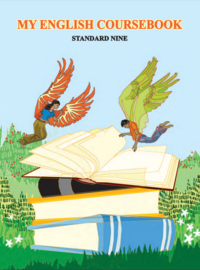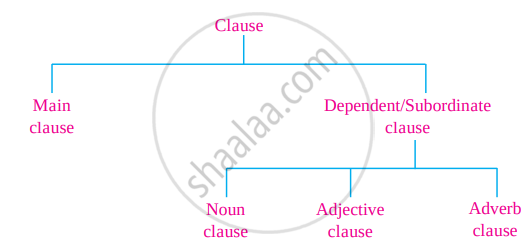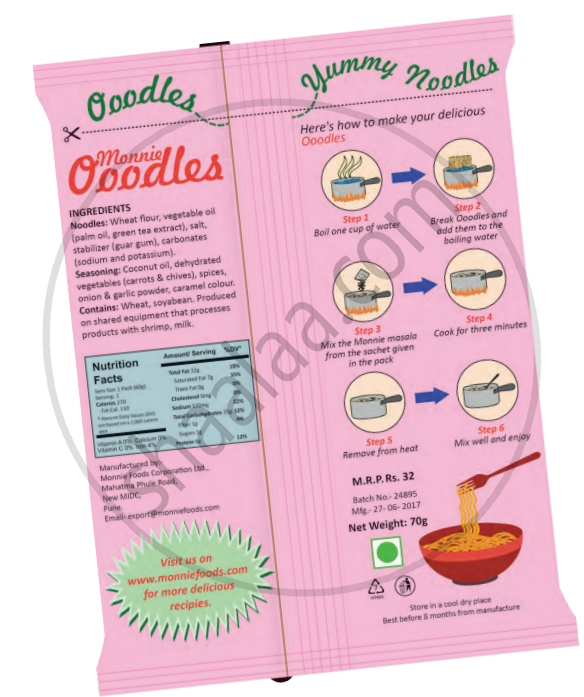Advertisements
Chapters
1.1: Walk a little slower
1.2: The Fun they Had
1.3: ‘Hope’ is the thing with feathers
1.4: The Story of Tea
1.5: The Necklace
UNIT TWO
2.1: Comparisons
2.2: Helen Keller and Anne Sullivan
2.3: Mark Twain
2.4: Please Listen!
2.5: A Play
UNIT THREE
3.1: Coromandel Fishers
3.2: The Fall of Troy
3.3: To a Butterfly
▶ 3.4: Think Before You Speak !
3.5: Great Scientists
UNIT FOUR
4.1: What is Success ?
4.2: Reading Works of Art
4.3: Silver
4.4: The Tempest
4.5: The Last Lesson
Chapter *: Language Study

Advertisements
Solutions for Chapter 3.4: Think Before You Speak !
Below listed, you can find solutions for Chapter 3.4 of Maharashtra State Board Balbharati for My English Coursebook 9 Standard Maharashtra State Board.
Balbharati solutions for My English Coursebook 9 Standard Maharashtra State Board 3.4 Think Before You Speak ! Warming up! [Page 80]
- Do you write a diary?
- Do you write letters or notes to your friends and relatives?
- Do you ever fight with your friends?
- Do you have arguments with your family members?
- What are the arguments about?
Read the following words which may be used in place of speak-
| talk | utter | tell | announce | declare |
| voice (an opinion, etc.) | Converse | say | chat | gossip |
| lecture | communicate | explain | uphold (an opinion) | support |
| praise | recommend | request | urge | plead |
| introduce | mention | refer to | discuss | remark on |
| rebuke | comment on | scold | chide | criticise |
| berate | pull up | reproach | admonish | suggest |
| indicate | mean | denote | show | reflect |
| express | reveal | |||
Tick the words you know and underline the ones that you do not know. Find their meaning and pronunciation from a good dictionary.
- Which of these words have a positive meaning?
- Which of these words suggest an unpleasant context?
Read the following words which may be used in place of speak-
| talk | utter | tell | announce | declare |
| voice (an opinion, etc.) | Converse | say | chat | gossip |
| lecture | communicate | explain | uphold (an opinion) | support |
| praise | recommend | request | urge | plead |
| introduce | mention | refer to | discuss | remark on |
| rebuke | comment on | scold | chide | criticise |
| berate | pull up | reproach | admonish | suggest |
| indicate | mean | denote | show | reflect |
| express | reveal | |||
Try to translate these words into your mother tongue to show the different shades of meaning.
Balbharati solutions for My English Coursebook 9 Standard Maharashtra State Board 3.4 Think Before You Speak ! Intext questions [Pages 81 - 82]
Prepare a similar list of adverbs which show the difference in the manner of saying or communicating something. A few examples are given here.
- politely
- brightly
- sweetly
- nicely
- lovingly
- kindly
- angrily
- rudely
- nastily
- quietly
- slowly
- quickly
Was Disraeli trying to give a scientific reason?
Was he only trying to give a message in a lighthearted but effective way?
You have learnt about adaptation in living things in your science textbooks. Find the biological reasons why man’s ears and mouth have developed the way they are now?
Draw comic diagrams to represent the content of the first two paragraphs.
Guess the meaning of was taken aback.
Guess the meaning of stammered.
Guess the meaning of exhausted.
Think about it:
Do you remember someone speaking to you angrily, without thinking?
What did you do on that occasion? Did you also speak angrily?
Discuss what you can do to control your anger.
Reflect: Have you ever passed on an empty remark or vain statement that might hurt someone else? What can you do to avoid doing it again?
Balbharati solutions for My English Coursebook 9 Standard Maharashtra State Board 3.4 Think Before You Speak ! ENGLISH WORKSHOP [Pages 84 - 87]
The same word can be used as a noun in some sentences and as a verb in others. For example,
- Many are the empty remarks. ______ (Noun)
- A wise man once remarked, ______ (Verb)
Make two sentences of your own with each of the words given below, using the same word as a noun in one and as a verb in another.
- change
- show
- throw
- return
- benefit
Complete the following:
Complete the following.
Our ears are like funnels because ______.
Complete the following.
The two rows of teeth are like a fence because ______.
Complete the following.
The two lips are like a fence because ______.
Complete the following.
Harsh words are like scattered bits of paper carried away by the wind because ______.
Write a brief summary of the story of the young man and his spiritual teacher, making the young man the narrator.
You may begin as given below.
'I went quickly to my spiritual teacher for advice because I had ______ (Now continue)
Translate the following sentence into your mother tongue.
The first question we must ask ourselves before we speak is - is it true?
Translate the following sentence into your mother tongue.
The second question to ask is - is it pleasant?
Translate the following sentence into your mother tongue.
The third question according to Socrates is - is it useful?
Language Study
Read the following sentence.
‘A very wise man once remarked that of the unspoken word, you are a master; of the spoken word, you are a slave.’
The sentence has two pairs of opposites - spoken and unspoken, and master and slave. The contrasting ideas make the sentence more effective. Putting together opposite or contrasting ideas in one sentence is a literary device. It is called antithesis.
Read the following examples of antithesis.
- Give every man thy ear, but few thy voice.
- Man proposes and God disposes.
- Speech is silver, but silence is gold.
- Patience is bitter, but it has a sweet fruit.
Find some examples of antithesis from your mother tongue and translate them into English.
We have seen that clauses are parts of a sentence, and they are classified as main and subordinate or dependent clauses. Dependent clauses can be further classified as follows according to the work they do in a sentence.

How do we decide whether a clause is a noun clause, an adjective clause or an adverb clause? There is a simple rule - we can replace an adverb clause with an adverb, an adjective clause with an adjective and a noun clause with a noun.
Look at the following examples -
- But I don’t know the answer. (Noun)
But I don’t know what they want. (Noun clause) - He told us a funny story. (Adjective)
He told us a story that was funny. (Adjective clause) - They went away. (Adverb)
They went when you were talking to your friend. (Adverb clause)
Now complete the following on your own :
- But I don’t know ____________.
- He told us ____________.
- They went ____________.
Think before you use! Name some ‘ready to eat’ and ‘ready to cook’ food items available in the market. Discuss the following in groups.
- Discuss whether it is necessary to use such items and why they are sold.
- Discuss the possible adverse effects of such food items.
Activity: Live English: Packs, packets, pouches, wrappers

Given above is the picture of an imaginary food item’s packet. Let us see how to ‘read’ the matter on the packet as a vigilant consumer.
- Look at the wrapper and complete the sentences.
- The name of the food item is ______.
- It is made by ______.
- It is a ______ food item. (Veg/Non-veg)
- The ______ sign indicates whether it is a Veg or Non-veg food item.
- The ingredients are ______, ______, ______, ______.
- The date of packing is ______ and the expiry date is ______.
- It should be consumed before ______ from the date of manufacturing.
- Try and obtain more information about the various symbols printed on the packet.
- Discuss the following -
- Why the ‘recipe’ is given on the packet.
- Why the packet tells us to visit the website of the company.
- What ideas are used to make the packet attractive?
- How you will verify whether something is good for you to eat.
Collect the outer coverings of fast food items. Discuss the following points in groups and then write your observations in your notebook.
- Ingredients
- Manufactured by
- Net weight
- Veg or Non-veg
- Recipe
- Nutrition facts
- MRP
- Mfg date
- Website
- Other instructions, if any
Work in groups and prepare an attractive wrapper or packet for any product of your choice. Prepare an advertisement for your product.
You want to convince the customer to buy your product. Prepare a conversation between you and the customer about it.
Your younger sister wants to eat something tasty. You are telling her the recipe of one such food item. Prepare a dialogue about it.
Solutions for 3.4: Think Before You Speak !

Balbharati solutions for My English Coursebook 9 Standard Maharashtra State Board chapter 3.4 - Think Before You Speak !
Shaalaa.com has the Maharashtra State Board Mathematics My English Coursebook 9 Standard Maharashtra State Board Maharashtra State Board solutions in a manner that help students grasp basic concepts better and faster. The detailed, step-by-step solutions will help you understand the concepts better and clarify any confusion. Balbharati solutions for Mathematics My English Coursebook 9 Standard Maharashtra State Board Maharashtra State Board 3.4 (Think Before You Speak !) include all questions with answers and detailed explanations. This will clear students' doubts about questions and improve their application skills while preparing for board exams.
Further, we at Shaalaa.com provide such solutions so students can prepare for written exams. Balbharati textbook solutions can be a core help for self-study and provide excellent self-help guidance for students.
Concepts covered in My English Coursebook 9 Standard Maharashtra State Board chapter 3.4 Think Before You Speak ! are Think before You Speak!, Grammar, Writing Skills, Reading Skills, Unseen Passage Comprehension, Unseen Poem Comprehension.
Using Balbharati My English Coursebook 9 Standard Maharashtra State Board solutions Think Before You Speak ! exercise by students is an easy way to prepare for the exams, as they involve solutions arranged chapter-wise and also page-wise. The questions involved in Balbharati Solutions are essential questions that can be asked in the final exam. Maximum Maharashtra State Board My English Coursebook 9 Standard Maharashtra State Board students prefer Balbharati Textbook Solutions to score more in exams.
Get the free view of Chapter 3.4, Think Before You Speak ! My English Coursebook 9 Standard Maharashtra State Board additional questions for Mathematics My English Coursebook 9 Standard Maharashtra State Board Maharashtra State Board, and you can use Shaalaa.com to keep it handy for your exam preparation.
